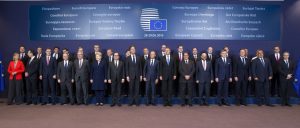The meetings of the European Council
Before the meeting
The President is responsible for the preparation of the meeting and he does so in co-operation with the President of the Commission and the General Affairs Council. His aims are to ensure that the debate will focus on politically sensitive points and finding solutions to them. Although the agenda is not binding, four weeks before the meeting the President sends an annotated draft agenda to the General Affairs Council where the agenda is then debated. The President also prepares draft conclusions, guidelines and decisions to be ready for the meeting and to make it as effective as possible (Schoutheete, 2012, p.48).
Although it might seem that the organisation of the meeting is an easy task, in practice there are many logistic and security issues involved. Please watch this video to gain an insight view of how difficult it is to organise a meeting of Heads of States and Governments:
During the meeting
An average meeting of the European Council takes two days. It normally begins with a dinner, the preparation of which is well depicted by the video you just watched.
The next day, after the family photograph, the official meeting starts. First, there is an address from the President of the European Parliament. For the rest of the day, the points on the agenda are discussed. The smoothness of the discussion is ensured by the President of the European Council, who can hold bilateral conversations with each delegation. He can also encourage two or more delegations to discuss specific problems between themselves (Schoutheete, 2012, p.49).
Decisions in the European Council are taken by consensus, except if the Treaty provides otherwise. A procedure other than consensus is normally used when decisions taken are going to have legal effects (Schoutheete, 2012, p.50).
Some other exceptions are:
- Rules of procedure – adopted by simple majority
- Major appointments: the President of the Commission or High Representative – adopted by qualified majority.
- Common defence – adopted by unanimity.
The President of the European Council and the President of the Commission do not hold any vote when the European Council takes a vote.
After the meeting
The conclusions of the European Council meeting are presented in a final document. If you would like to see how they look like, all European Council conclusions are available here.
The meetings are followed by press conferences.
A few days after the meeting, the President of the European Council and the President of the Commission report to the European Parliament. This ensures communication between institutions (Schoutheete, 2012, p.52).
Find the latest European Council Conclusions online. Note the wording. What does it tell you about the nature of the European Council?
- In what areas does the European Council play a role?
- What is the role of the European Council in handling the Euro crisis?
If something is still not clear or you would like to find out more details about the working of the Council you can always read the Rules of Procedure, which specify the proceedings of the European Council.
Calendar
| M | T | W | T | F | S | S |
|---|---|---|---|---|---|---|
| 1 | ||||||
| 2 | 3 | 4 | 5 | 6 | 7 | 8 |
| 9 | 10 | 11 | 12 | 13 | 14 | 15 |
| 16 | 17 | 18 | 19 | 20 | 21 | 22 |
| 23 | 24 | 25 | 26 | 27 | 28 | |

Leave a Reply